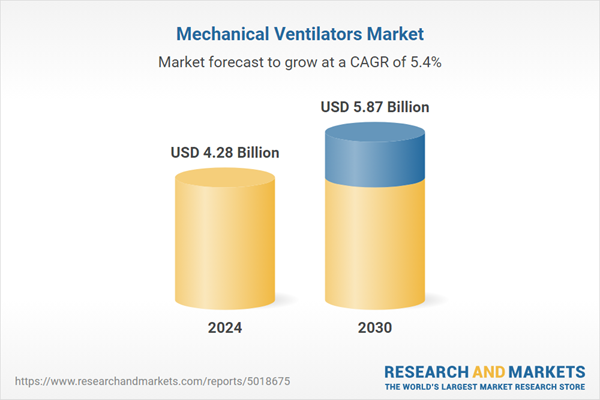Speak directly to the analyst to clarify any post sales queries you may have.
10% Free customizationThis report comes with 10% free customization, enabling you to add data that meets your specific business needs.
The two primary methods of mechanical ventilation are positive pressure ventilation, where air is forcibly delivered into the lungs, and negative pressure ventilation, where air is drawn into the lungs through the chest's stimulating movement. Mechanical ventilators are commonly employed in the treatment of respiratory ailments, strokes, chronic obstructive pulmonary disease, and other medical conditions. Mechanical ventilation is a life-sustaining technique that aids patients with severe illnesses in maintaining vital breathing functions.
Key Market Drivers
Increase in the Geriatric Population
The rise in the geriatric population and the prevalence of chronic respiratory disorders are anticipated to drive the demand for ventilators. Increasing awareness of lung cancer symptoms and a growing number of patients in medical facilities contribute to the significant market growth of ventilators. However, it should be noted that the use of mechanical ventilation may pose certain risks, such as increased infection risk and potential damage to the lungs. These considerations should be taken into account when assessing the market growth potential of mechanical ventilators.Key Market Challenges
High Cost of Operation
Operating a hospital involves substantial fixed costs, such as building maintenance, utilities, and equipment purchases. With lower patient volumes in rural areas, these fixed costs become a more significant burden on the facility's budget. Rural hospitals often have limited access to capital and financial resources compared to larger urban hospitals. They may struggle to invest in expensive medical equipment like mechanical ventilators, which can impact patient care capabilities. Budgetary constraints faced by small healthcare facilities are also expected to restrict the adoption of Mechanical Ventilators.Rural and suburban hospitals strive to provide patients with the highest quality of care while simultaneously overcoming challenges posed by their remote geographic location, limited workforce, small size, and constrained financial resources. The low patient volumes in rural hospitals make it challenging for these organizations to manage the significant fixed costs associated with hospital operations. Consequently, they become particularly susceptible to policy and market changes, as well as to Medicare and Medicaid payment reductions.
Key Market Trends
Non-Invasive Ventilation Options
Non-invasive ventilation carries a lower risk of complications compared to invasive mechanical ventilation. Intubation is an invasive procedure that can lead to complications such as ventilator-associated pneumonia, tracheal injury, and ventilator-induced lung injury. In some cases, NIV can be used for outpatient management of respiratory conditions, providing patients with the flexibility to receive treatment at home or in a less acute care setting.Non-invasive ventilation can be used as a bridge to wean patients off invasive mechanical ventilation. It allows for a gradual reduction in ventilator support, helping patients regain independent breathing. There is a growing interest in developing non-invasive ventilation options that provide effective respiratory support without the need for intubation. This could reduce the risk of complications associated with invasive mechanical ventilation.
Key Market Players
- Getinge AB
- Medtronic PLC
- Koninklijke Philips NV
- Smiths Medical
- ResMed Inc.
- Dragerwerk AG & Co. KGaA
- GE Healthcare
- Mindray Medical International Limited
- Nihon Kohden Corporation
- Vyaire Medical Inc.
Report Scope:
In this report, the Global Mechanical Ventilators Market has been segmented into the following categories, in addition to the industry trends which have also been detailed below:Mechanical Ventilators Market, By Product Type:
- Intensive Care Unit/Critical Care
- Transport/Portable/Ambulatory
- Neonatal Care
Mechanical Ventilators Market, By Interface:
- Non-invasive Ventilation
- Invasive Ventilation
Mechanical Ventilators Market, By End User:
- Hospital & Clinic
- Home Care
- Ambulatory Surgical Centre
Mechanical Ventilators Market, By Region:
- North America
- United States
- Canada
- Mexico
- Europe
- France
- United Kingdom
- Italy
- Germany
- Spain
- Asia-Pacific
- China
- India
- Japan
- Australia
- South Korea
- South America
- Brazil
- Argentina
- Colombia
- Middle East & Africa
- South Africa
- Saudi Arabia
- UAE
Competitive Landscape
Company Profiles: Detailed analysis of the major companies present in the Global Mechanical Ventilators Market.Available Customizations:
With the given market data, the publisher offers customizations according to a company's specific needs. The following customization options are available for the report.Company Information
- Detailed analysis and profiling of additional market players (up to five).
Table of Contents
Companies Mentioned
- Getinge AB
- Medtronic PLC
- Koninklijke Philips NV
- Smiths Medical
- ResMed Inc.
- Dragerwerk AG & Co. KGaA
- GE Healthcare
- Mindray Medical International Limited
- Nihon Kohden Corporation
- Vyaire Medical Inc.
Table Information
| Report Attribute | Details |
|---|---|
| No. of Pages | 185 |
| Published | August 2025 |
| Forecast Period | 2024 - 2030 |
| Estimated Market Value ( USD | $ 4.28 Billion |
| Forecasted Market Value ( USD | $ 5.87 Billion |
| Compound Annual Growth Rate | 5.4% |
| Regions Covered | Global |
| No. of Companies Mentioned | 10 |









